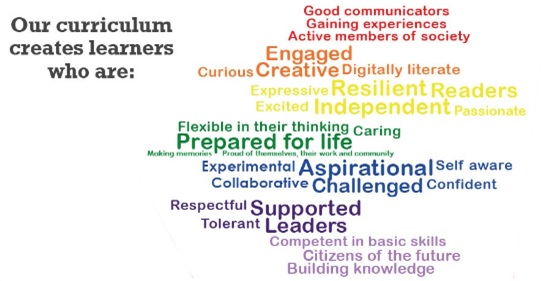Enjoy achieving together…to be the best that we can be!
Curriculum Intent for Religious Education
At Usworth Colliery Primary School, we recognise the importance and value of Religious Education for all pupils, with on-going benefits for an open, articulate and understanding society. We use the Sunderland Agreed Syllabus to support pupils to understand the principal aim of RE:
To explore what people believe and what difference this makes to how they live, so that pupils can gain the knowledge, understanding and skills needed to handle questions raised by religion and belief, reflecting on their own ideas and ways of living.
Religious education at our school contributes to children’s education by provoking challenging questions about meaning and purpose in life, about issues of right and wrong, and of what it means to be human. In RE, pupils learn about religions and beliefs in local, national and global contexts, developing systematic knowledge and understanding, enabling them to develop their ideas, values and identities. This subject aims to develop in pupils an aptitude for dialogue so that they can participate positively in our society, allowing them to articulate clearly and coherently their personal beliefs, ideas, values and experiences while respecting the right of others to differ.
The curriculum for RE aims to ensure that all pupils:
1. Make sense of a range of religious and non-religious beliefs, so that they can:
• identify, describe, explain and analyse beliefs and concepts in the context of living religions, using appropriate vocabulary
• explain how and why these beliefs are understood in different ways, by individuals and within communities
• recognise how and why sources of authority are used, expressed and interpreted developing skills of interpretation
2. Understand the impact and significance of religious and non-religious beliefs, so that they can:
• examine and explain how and why people express their beliefs in diverse ways
• recognise and account for ways in which people put their beliefs into action in diverse ways, in their everyday lives, within their communities and in the wider world
• appreciate and appraise the significance of different ways of life and ways of expressing meaning
3. Make connections between religious and non-religious beliefs, concepts, practices and ideas studied, so that they can:
• evaluate, reflect on and enquire into key concepts and questions studied, responding thoughtfully and creatively, giving good reasons for their responses
• challenge the ideas studied, and allow the ideas studied to challenge their own thinking, articulating beliefs, values and commitments clearly in response
• discern possible connections between the ideas studied and their own ways of understanding the world, expressing their critical responses and personal reflections with increasing clarity and understanding.
 Our Curriculum creates learners who are:
Our Curriculum creates learners who are:
RE in the Early Years Foundation Stage
Religious Education at Usworth Colliery School sets out experiences, opportunities and appropriate topics for children in the Foundation Stage. The RE units covered in the EYFS are good learning in themselves, but also connect to the EYFS seven areas of learning. Planned teaching experiences will support children’s learning and development needs, as identified through holistic assessment. Our Early Years teaching stems from children’s own experience where we find ways to draw on the wealth of religious or spiritual experiences that some families may bring with them.
RE sits very firmly within the areas of personal, social and emotional development and understanding the world. Our RE units enable children to develop a positive sense of themselves, and others, and to learn how to form positive and respectful relationships. They will do this through a balance of guided, planned teaching and pursuing their own learning within an enabling environment. They will begin to understand and value the differences of individuals and groups within their own immediate community. Children will have the opportunity to develop their emerging moral and cultural awareness.
Children in EYFS will encounter religious and non-religious worldviews through special people, books, times, places and objects and by visiting places of worship. They will listen to and talk about stories where they will be introduced to subject-specific words and use all their senses to explore beliefs, practices and forms of expression. They will be encouraged to ask questions and reflect on their own feelings and experiences, using their imagination and curiosity to develop their appreciation of the world in which they live.
RE Curriculum
